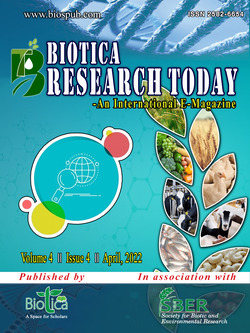
Scientific Beekeeping Technology for Sustainable Agriculture and Employment Generation
Shaon Kumar Das*
ICAR-Research Complex for NEH Region, Sikkim Centre, Gangtok (737 102), Sikkim, India
Ezekiel K. Bhujel
ICAR-Research Complex for NEH Region, Sikkim Centre, Gangtok (737 102), Sikkim, India
E.L. Devi
ICAR-Research Complex for NEH Region, Sikkim Centre, Gangtok (737 102), Sikkim, India
Ramgopal Laha
ICAR-Research Complex for NEH Region, Sikkim Centre, Gangtok (737 102), Sikkim, India
V.K. Mishra
ICAR-Research Complex for NEH Region, Umiam, Meghalaya (793 103), India
DOI: NIL
Keywords: Bee keeping, Employment generation, Honey, Pollination
Abstract
Beekeeping (or apiculture) is the maintenance of bee colonies, commonly in man-made hives, by humans. Beekeeping is an agro-based occupation that provides income and employment generation for rural and tribal families. It plays a vital role in the present context of the commercialization of agriculture and liberalization of the economy. It covers the entire scope of honeybee resources, bee-products, beekeeping practices, pollination services, and their interface with business systems and ecological integrity. Bees are a special gift to mankind due to their pollination services and valued products like honey, beeswax, propolis, bee venom, etc. Honey bee farming in India is also a good source of income for the farmers especially during the period when the growth of crop is still under process. After Indian independence, beekeeping was promoted through various rural developmental programs. Beekeeping has been included as an activity for promoting cross pollination of Horticultural Crops under National Horticulture Mission since May, 2005.
Downloads
not found
Reference
Abrol, D.P., 2007. Foraging behaviour of Apis mellifera L. and Apis cerana F. as determined by the energetics of nectar production in different cultivars of Brassica campestris var. toria. Journal of Agricultural Science 51, 1\9-1\124.
Aryal, S., Thapa, R., Jung, C., 2015. An overview of beekeeping economy and its constraints in Nepal. Journal of Apiculture 30(3), 135-142.
Das, S.K., Ghosh, G.K., 2021. Developing biochar-based slow-release N-P-K fertilizer for controlled nutrient release and its impact on soil health and yield. Biomass Conversion and Biorefinery. DOI: https://doi.org/10.1007/s13399-021-02069-6.
Khan, N., Khan, W., 2018. Review of past literature of honey beekeeping and its production in rural areas of the world. Food Science and Quality Management 74, 6, 18-23.
